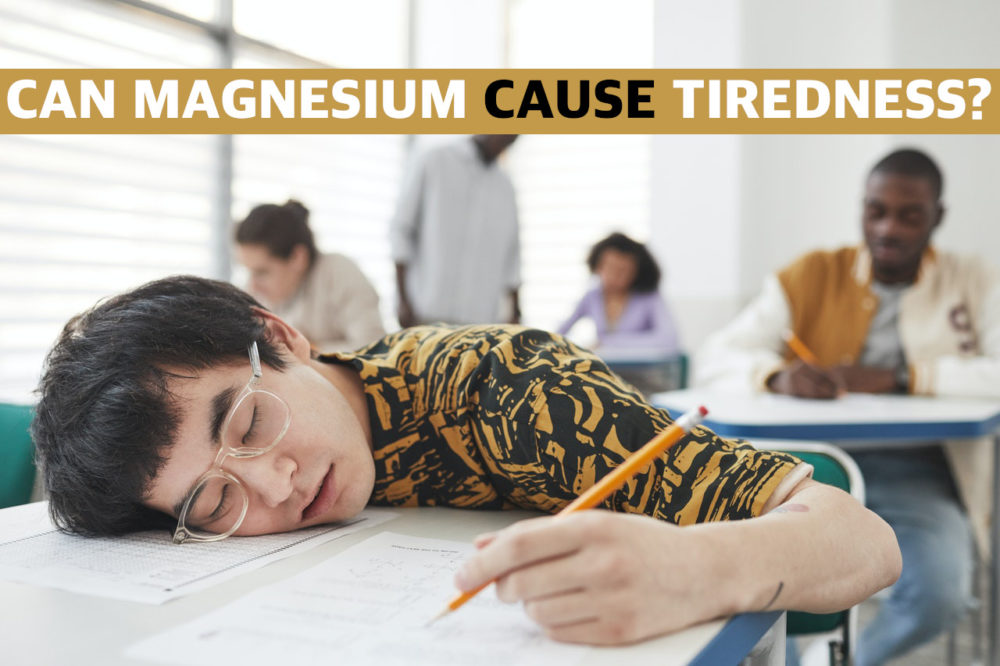Magnesium is one of the most versatile supplements available in modern times. Able to seemingly help with all manner of symptoms it’s no wonder it’s popularity amongst the health concious appears to rise. However with everyone responding differently to supplements, not everyone has the same positive reactions. Can magnesium actually make us feel more tired especially the following day?
When we ingest magnesium, through supplements or other means, it instructs a number of mechanisms to happen in our body. Frequently magnesium is used to alleviate feelings of anxiety, cramps or increasing energy to make us feel less tired. Magnesium can have a sedative effect on our muscles and nervous system which can make us feel more relaxed and tired. Whilst this won’t happen to everyone we all experience different reactions when using supplements because each of us has a unique chemical composition, much like a fingerprint.
A good magnesium supplement is something we quickly get used to and oftentimes feel like we can’t live without. Once you get used to a particular brand and type of magnesium, it can be hard to switch to a new one. However, sometimes it’s good to evaluate your supplement stack and decide whether its entirely benefiting you. If you feel your magnesium supplement is causing fatique, sometimes the next day, it may be time to consider switching your routine.
Does magnesium cause tiredness the next day?
Magnesium supplementation has the ability to make us feel fatigued through a number of actions. Firstly it’s important to realise that feeling tired after taking magnesium can actually be a result of feeling less anxious, stressed, or generally at ease for the first time in a long while. Don’t underestimate how modern life can make us feel so wired that when we have a dip in energy it can often be mistaken for being burnt out.
With that being said magnesium does have the ability to make us feel bleary-eyed. This is a response to magnesiums ability to sedate the nervous system. In fact, magnesium has been used in intensive care as a sedative alongside other anaesthetic drugs.
What can you do about magnesium causing tiredness?
Magnesium is commonly used to improve sleep quality so its no surprise that it could effect levels of energy. One of the ways magnesium helps us to feel tired at night time is by reducing levels of cortisol. Magnesium can help to regulate our levels of cortisol by balancing hormone production. Cortisol is classed as a steroid hormone that’s produced by our adrenal glands, in doing so it can provide our bodies with short team energy. Cortisol levels fluctuate throughout the day in order to provide us with the right amount of energy. Generally when we first wake up our cortisol levels are almost at their most high, within twenty to thirty minutes of waking up they can increase to maximum levels for the day. Gradually as the day progresses our cortisol levels decline as natural response to our decline in activities. This helps our body prepare for a restfull nights sleep.
Whilst we sleep our body is given the chance for our cortisol levels to replenish ready to provide energy the following day. However if we are supplementing magnesium, especially before bedtime, it can leave us feel tired the following day. This is because the magnesium supplementation is effectively blunting the effects of cortisol and mitigating the effect it should have on our bodies first thing in the morning. If this is happening to you then magnesium could be causing tiredness the day after use.
Symptoms such as weight loss, dizziness, and fatigue are all attributed to low cortisol levels. Consider this when deciding when and how much magnesium to supplement.
What can you do about magnesium causing tiredness?
Be dilligent about monitoring symptoms after taking a new supplement. If you wake up the next day feeling groggy, dizzy, or generally unrested then magnesium may be to blame. You may be experiencing positive effects of magnesium alongside these negative effects and don’t want to throw the baby out with the bath water so to speak. This is fine.
Instead of stopping magnesium altogether consider the time you decide to take your supplements. If you’re feeling tired the following day you may want to reconsider taking magnesium right before bed. If you’re experiencing anxiety in the morning or middle of the day experiment with consuming your magnesium at this time instead. This may give chance for your cortisol levels to naturally replenish at a more balanced rate by time you go to sleep.
Is magnesium causing you anxiety, depression or heart palpitations? You’re not alone. Find out more in Why Magnesium Stopped Working For You – How to fix it!

